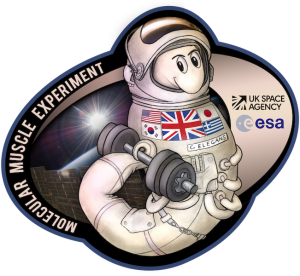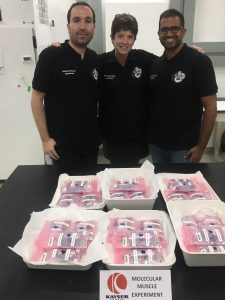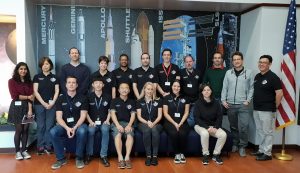I’m a molecular and cellular biologist with extensive experience in designing and performing ambitious research plans.
I obtained my Bachelor of Science (B.S.) and Master of Science (M.S.) degrees from University of Lisbon. I earned my PhD degree in Circadian Biology at University College London (UCL) in the laboratory of Prof. David Whitmore, studying the role of the circadian clock in cell cycle regulation and zebrafish development.
My postdoctoral research, performed in the laboratory of Prof. Monica Driscoll, is focused on the anti-aging benefits of exercise training in C. elegans and the effects of spaceflight on neuronal biology.
Research Projects:
– Swim exercise training in C. elegans induces broad and long-lasting health benefits

Over the last few years, I established that C. elegans swim training is a valid exercise model. I have shown that a single swim session in C. elegans induces key features of mammalian exercise, including locomotory fatigue, muscle mitochondrial oxidation, oxidative stress response, and significant changes in carbohydrate and fat metabolism (Laranjeiro et al., BMC Biology, 2017).
Importantly, I developed and optimized a novel long-term swim exercise protocol for C. elegans that induces robust health improvements in muscle, intestine, pharynx (a cardiac-like tissue), and the nervous system. Remarkably, I observed that a swim exercise regimen performed during C. elegans early adulthood, but then ended, still induces long-lasting systemic benefits that remain detectable well into mid-life (Laranjeiro et al., PNAS, 2019).
Might similar biology apply to humans? A recent report suggests that the answer to this question may be yes: human volunteers who enrolled in an 8-month exercise regimen still exhibited improvements in aerobic capacity and metabolic health when measured 10 years after completion of regular exercise training (Johnson et al., Front. Physiol., 2019). The apparent conservation of persistent health benefits of limited exercise training from nematodes to humans suggests that the traditional “use it or lose it” view on exercise adaptation may not be the whole story of exercise outcome, and suggests the existence of a potential switch mechanism for healthy aging trajectories that may be triggered by even limited early enhanced activity. One of my major goals is to identify this molecular switch and ultimately test for its conservation.
Media exposure:
New Scientist ‘Why fitness training for worms and flies could make humans healthier’ (16 December 2020)
– Spaceflight affects adult neuronal morphology and clearance of neuronal trash

I’m a team member of a multinational collaborative project – the Molecular Muscle Experiment – that on December 5, 2018 sent multiple C. elegans strains to the International Space Station (ISS) aboard a SpaceX Falcon 9 rocket from Florida’s Kennedy Space Center. The aim of this project is to study the molecular mechanisms involved in muscle mass loss during spaceflight (astronauts can lose up to 40% of their muscle mass in space).
I found that animals that lived 5 days of their adult life on the ISS exhibited considerable morphological remodeling of adult neurons when compared to ground control C. elegans. I also found that, when neurons express an introduced aggregating protein, spaceflight promotes a remarkable accumulation of neuronal-derived waste in the surrounding tissues, suggesting an inability to degrade toxic debris that is released from neurons (Laranjeiro et al., iScience, 2021).
Overall, my data reveal that spaceflight can significantly affect adult neuronal morphology and clearance of neuronal trash, highlighting the need to carefully assess the risks of long-duration spaceflight on the nervous system and to develop countermeasures that protect human health during space exploration. I will be involved in the next spaceflight launch planned for May 2021, sending a new set of C. elegans strains to space to study muscle and neuronal aging under microgravity conditions.


Media exposure:
Cell Press ‘The biology of spaceflight’ (25 November 2020)
Rutgers News & Events ‘Rutgers Scientist Sends Worms into Outer Space’ (December 2018)
Publications
-
Spaceflight affects neuronal morphology and alters transcellular degradation of neuronal debris in adult Caenorhabditis elegans, Laranjeiro R, Harinath G, Pollard AK, Gaffney CJ, Deane CS, Vanapalli SA, Etheridge T, Szewczyk NJ, and Driscoll M,
iScience, 2021, 24(2): 102105 -
Multi-environment phenotyping of C. elegans for robust evaluation of physical performance, Hewitt JE, Laranjeiro R, Norouzi M, Ellwood R, Antebi A, Szewczyk NJ, Driscoll M, and Vanapalli SA,
bioRxiv: 10.1101/2020.08.17.253583 (2020) -
Swim exercise in Caenorhabditis elegans extends neuromuscular and gut healthspan, enhances learning ability, and protects against neurodegeneration, Laranjeiro R, Harinath G, Hewitt JE, Hartman JH, Royal MA, Meyer JN, Vanapalli SA, and Driscoll M,
PNAS, 2019, 116: 23829-23839 -
Pluronic gel-based burrowing assay for rapid assessment of neuromuscular health in C. elegans, Lesanpezeshki L, Hewitt JE, Laranjeiro R, Antebi A, Driscoll M, Szewczyk NJ, Blawzdziewicz J, Lacerda CMR, and Vanapalli SA,
Scientific Reports, 2019, 9: 15246 -
Swimming Exercise and Transient Food Deprivation in Caenorhabditis elegans Promote Mitochondrial Maintenance and Protect Against Chemical-Induced Mitotoxicity, Hartman JH, Smith LL, Gordon KL, Laranjeiro R, Driscoll M, Sherwood DR, and Meyer JN,
Scientific Reports, 2018, 8: 8359 -
Single swim sessions in C. elegans induce key features of mammalian exercise, Laranjeiro R, Harinath G, Burke D, Braeckman BP, and Driscoll M,
BMC Biology, 2017, 15:30 -
Circadian Clock Synchronization of the Cell Cycle in Zebrafish Occurs through a Gating Mechanism Rather Than a Period-phase Locking Process, Laranjeiro R, Tamai TK, Letton W, Hamilton N, and Whitmore D,
Journal of Biological Rhythms, 2018, 33: 137-150 -
Transcription factors involved in retinogenesis are co-opted by the circadian clock following photoreceptor differentiation, Laranjeiro R and Whitmore D,
Development, 2014, 141: 2644-2656 -
Cyclin-dependent kinase inhibitor p20 controls circadian cell-cycle timing, Laranjeiro R, Tamai TK, Peyric E, Krusche P, Ott S, and Whitmore D,
PNAS, 2013, 110: 6835-6840 -
The Notch ligand Delta-like 4 regulates multiple stages of early hemato-vascular development, Laranjeiro R, Alcobia I, Neves H, Gomes AC, Saavedra P, Carvalho CC, Duarte A, Cidadão A, and Parreira L,
Plos One, 2012, 7: e34553 -
Portrayal of the Notch system in embryonic stem cell-derived embryoid bodies, Alcobia I, Gomes A, Saavedra P, Laranjeiro R, Oliveira S, Parreira L, and Cidadão A,
Cells Tissues Organs, 2011, 193: 239-252
Awards & Distinctions
-
American Heart Association Postdoctoral Fellowship (2018)
One-year postdoctoral fellowship awarded to research projects aimed at promoting longer, healthier lives. Title: Molecular dissection of systemic exercise signals over C. elegans lifetime
-
Life Sciences Research Foundation Postdoctoral Fellowship (sponsored by the Simons Foundation) (2015)
Three-year postdoctoral fellowship awarded to "exceptional young scientists at a critical juncture of their training in all areas of basic life sciences". Title: C. elegans as a model for molecular genetic analyses of exercise benefits to healthy aging
-
UCL Best Poster Presentation (2013)
2nd Prize for Best Poster Presentation at the ‘University College London Graduate School Poster Competition 2012/13’.
-
BSDB Best Poster Presentation (2011)
2nd Prize for Best Poster Presentation at the ‘2011 British Society for Developmental Biology Spring Meeting’.
-
YEN Best Poster Presentation (2011)
1st Prize for Best Poster Presentation at the ‘3rd Young Embryologist Meeting’.
-
PhD scholarship from Fundação para a Ciência e a Tecnologia (2009)
Fully funded four-year scholarship awarded by the Portuguese government to pursue my PhD degree at University College London.
-
Santander Honor Scholarship (2006)
Award for academic excellence during my Bachelor of Science degree at University of Lisbon.